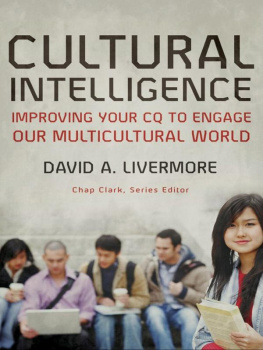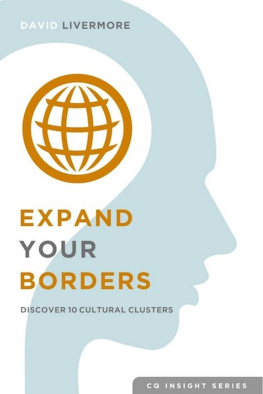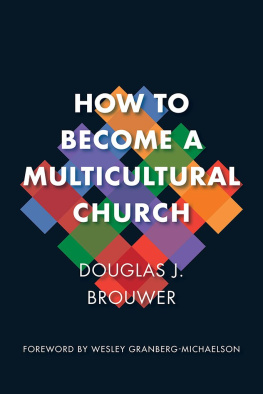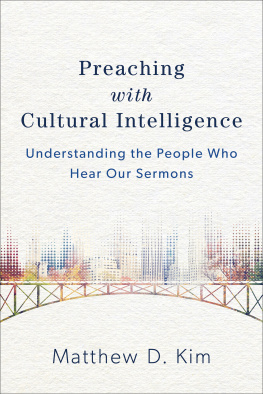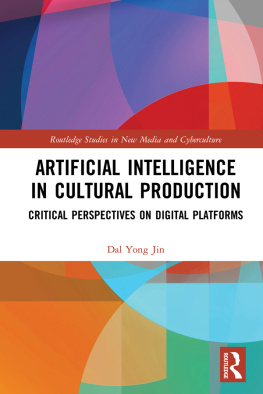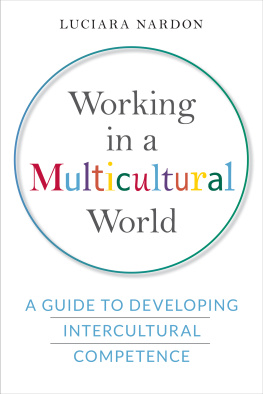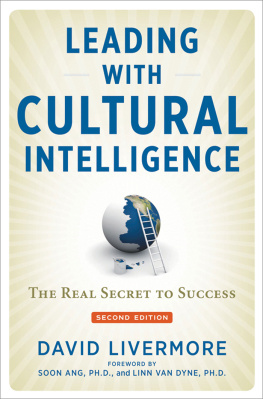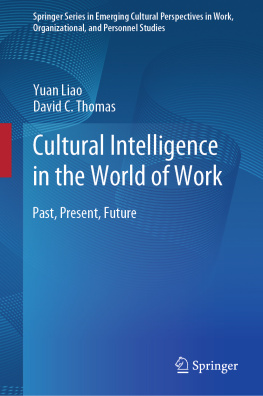David A. Livermore - Cultural Intelligence: Improving Your CQ to Engage Our Multicultural World
Here you can read online David A. Livermore - Cultural Intelligence: Improving Your CQ to Engage Our Multicultural World full text of the book (entire story) in english for free. Download pdf and epub, get meaning, cover and reviews about this ebook. year: 2009, publisher: Baker Publishing Group, genre: Religion. Description of the work, (preface) as well as reviews are available. Best literature library LitArk.com created for fans of good reading and offers a wide selection of genres:
Romance novel
Science fiction
Adventure
Detective
Science
History
Home and family
Prose
Art
Politics
Computer
Non-fiction
Religion
Business
Children
Humor
Choose a favorite category and find really read worthwhile books. Enjoy immersion in the world of imagination, feel the emotions of the characters or learn something new for yourself, make an fascinating discovery.
- Book:Cultural Intelligence: Improving Your CQ to Engage Our Multicultural World
- Author:
- Publisher:Baker Publishing Group
- Genre:
- Year:2009
- Rating:3 / 5
- Favourites:Add to favourites
- Your mark:
- 60
- 1
- 2
- 3
- 4
- 5
Cultural Intelligence: Improving Your CQ to Engage Our Multicultural World: summary, description and annotation
We offer to read an annotation, description, summary or preface (depends on what the author of the book "Cultural Intelligence: Improving Your CQ to Engage Our Multicultural World" wrote himself). If you haven't found the necessary information about the book — write in the comments, we will try to find it.
Cultural Intelligence: Improving Your CQ to Engage Our Multicultural World — read online for free the complete book (whole text) full work
Below is the text of the book, divided by pages. System saving the place of the last page read, allows you to conveniently read the book "Cultural Intelligence: Improving Your CQ to Engage Our Multicultural World" online for free, without having to search again every time where you left off. Put a bookmark, and you can go to the page where you finished reading at any time.
Font size:
Interval:
Bookmark:

Cultural Intelligence
Youth, Family,
and Culture Series
Chap Clark, series editor
The Youth, Family, and Culture series examines the broad categories involved in studying and caring for the needs of the young and is dedicated to the preparation and vocational strengthening of those who are committed to the spiritual development of adolescents.
Cultural Intelligence
Improving Your CQ to Engage
Our Multicultural World
David A. Livermore

2009 by David A. Livermore
Published by Baker Academic
a division of Baker Publishing Group
P.O. Box 6287, Grand Rapids, MI 49516-6287
www.bakeracademic.com
Printed in the United States of America
All rights reserved. No part of this publication may be reproduced, stored in a retrieval system, or transmitted in any form or by any meansfor example, electronic, photocopy, recordingwithout the prior written permission of the publisher. The only exception is brief quotations in printed reviews.
Library of Congress Cataloging-in-Publication Data
Livermore, David A., 1967
Cultural intelligence : improving your CQ to engage our multicultural world youth, family, and culture / David A. Livermore.
p. cm.
Includes bibliographical references.
ISBN 978-0-8010-3589-0 (pbk.)
1. Christianity and culture. I. Title.
BR115.C8L58 2009
261dc22
2008045365
Scripture quotations are from the HOLY BIBLE, NEW INTERNATIONAL VERSION. NIV. Copyright 1973, 1978, 1984 by International Bible Society. Used by permission of Zondervan. All rights reserved.
contents
I n many ways, youth ministry has come of age. No longer seen as a stepping-stone to real ministry in the church, especially in North America, youth ministry is now seen as a viable career option. Over the last few decades a wide range of professional resources, conferences, periodicals, and books have been developed on this topic. Most Christian colleges and seminaries now offer a variety of coursesif not degree programsin youth ministry. Youth ministry has all it needs to continue to push the church to care about and serve the needs of the young in Gods name, except for one thing: we have a long way to go to develop a rich, broad, and diverse conversation that frames, defines, and grounds our missional call.
There is good news, of course. There is a professional organization, Association of Youth Ministry Educators, that sponsors an annual conference and publishes a solid emerging journal. Several thoughtful books have helped to shape the disciplines future. There are also now two major publishers who have academic lines dedicated to furthering the field of youth ministry. We have made great progress, but we must all work together to continue deepening our understanding of what youth ministry should be.
The purpose of Baker Academics Youth, Family, and Culture series is to raise the level of dialogue concerning how we think about, teach, and live out youth ministry. As a branch of practical theology, academic youth ministry must move beyond a primarily skills-based focus to a theologically driven expression of a contextualized commitment of the local church to a targeted population. James Fowler defines practical theology as theological reflection and construction arising out of and giving guidance to a community of faith in the praxis of its mission. Practical theology is critical and constructive reflection leading to ongoing modification and development of the ways the church shapes its life to be in partnership with Gods work in the world. This is precisely what those of us who are called to engage the church in theological reflection of contemporary youth and family issues must dodevelop a practical theology that takes seriously the reality of the context we are in, regardless of how and where it takes us. This is the future of youth and family ministry in the church.
Dave Livermores Cultural Intelligence is the second book in the Youth, Family, and Culture series. Dr. Livermore brings a vital and helpful correction to how we think about cross-cultural ministry and relationships, issues highly relevant to individuals involved in youth ministry, missions, and church ministry. His book is thoroughly theological and at the same time eminently practical. Thus, this volume is an example of a practical theology of youth and family ministry. May this book spur on our much-needed conversation of what it means to be in youth ministry, now and in the future.
Chap Clark
Fuller Theological Seminary
May 2008
T o Andrew and Lynn Rudd, for a priceless friendship made richer because of our shared journey through fundamentalism.
To Steve and Jen Argue, for the taste of heaven I get from the countless ways our lives, families, and ministry intersect.
To my colleagues and students at Grand Rapids Theological Seminary, for the ways you supportively stretch me in thinking about what culturally intelligent service looks like for our learning community.
To Bob Hosack and Chap Clark, for a professional relationship built upon shared concerns and friendship and for making this topic a publishing priority.
To Linda, Emily, and Grace, for loving me like no one else does, despite my manic moments of writing and traveling. Youve shared every moment of this book with me. I love you.
W hat do you do when you encounter someone who isnt like you? How do you feel? What goes on inside you? How do you relate to him or her? These are the kinds of questions we want to explore in this book. Few things are more basic to life than expressing love and respect for people who look, think, believe, act, and see differently than we do. We want to adapt to the barrage of cultures around us while still remaining true to ourselves. We want to let the world change us so that we can be part of changing the world. And we want to move from the desire to love across the chasm of cultural difference to the ability to express our love for people of difference. Relating lovingly to our fellow human beings is central to what it means to be human. And when it comes down to it, Christian ministry at its core is interacting with all kinds of people in ways that give them glimpses of Jesus in us.
The billions of us sharing planet Earth together have so much in common. Were all born. We all die. Were all created in the image of God. We eat, sleep, persevere, and care for our young. We long for meaning and purpose, and we develop societies with those around us.
But the way we go about the many things we have in common is deeply rooted in our unique personalities and cultures. So although we have so much in common, we have as much or more about us thats different. Asian. European. Tattooed. Clean-cut. Male. Female. Old. Young. Pentecostal. Emergent. Republican. Democrat. Suburban. Rural. Urban. These points of difference are where we find both our greatest challenges and our greatest discoveries. And as the world becomes increasingly more connected and accessible, the number of encounters we have with those who are culturally different are growing daily. Most of us are more comfortable with people like ourselves. But seeking out and loving people of difference is a far greater challenge. Therefore, learning how to reach across the chasm of cultural difference with love and respect is becoming an essential competency for todays ministry leader.
Why This Book?
There are several helpful resources available on cross-cultural ministry. Many of these have informed my own thinking and practice. However, research has shown that a significant number of missional initiatives continue to fail because of cultural differences. something has to change. With the growing opportunities for multicultural interactions at home and abroad, the question of how ministry leaders and their organizations can effectively minister in culturally diverse situations is a critical and challenging problem. This problem cannot be addressed by simple lists of cultural taboos that sometimes appear in books on cross-cultural interaction. On the other hand, some books on contextualization are so complex and cerebral that ministry leaders are tempted to toss them aside as little more than ivory-tower rhetoric. This book attempts to bridge the gap between theory and practice.
Next pageFont size:
Interval:
Bookmark:
Similar books «Cultural Intelligence: Improving Your CQ to Engage Our Multicultural World»
Look at similar books to Cultural Intelligence: Improving Your CQ to Engage Our Multicultural World. We have selected literature similar in name and meaning in the hope of providing readers with more options to find new, interesting, not yet read works.
Discussion, reviews of the book Cultural Intelligence: Improving Your CQ to Engage Our Multicultural World and just readers' own opinions. Leave your comments, write what you think about the work, its meaning or the main characters. Specify what exactly you liked and what you didn't like, and why you think so.

